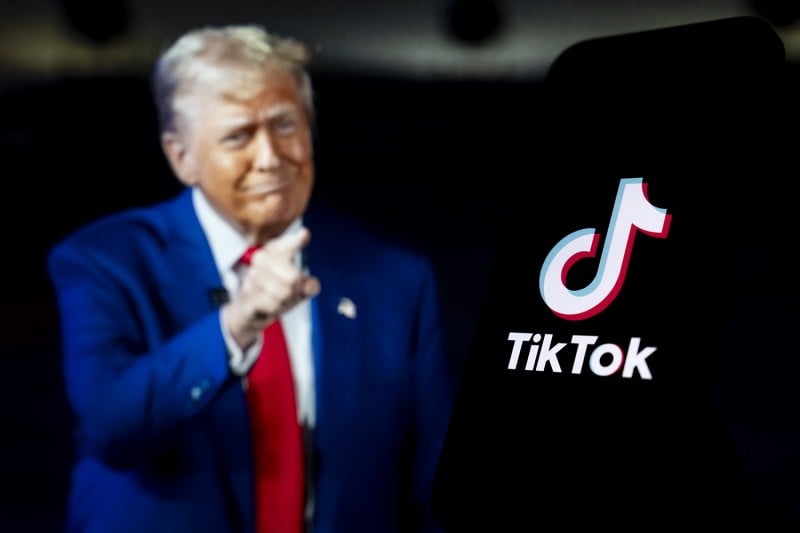Trump Won’t Give Up (on) TikTok

Trump Won’t Give Up (on) TikTok
The U.S. president has taken negotiations down to the wire to save the popular video-sharing app.
The Tiktok logo is displayed on a phone screen in front of a screen showing U.S. President Donald Trump on Jan. 30. Muhammed Selim Korkutata/Anadolu via Getty Images photo illustration
Welcome back to Foreign Policy’s Situation Report, where yet another intense week of news has us craving a restful and quiet weekend—even if we didn’t earn it by making a record-breaking 25-hour Senate speech.
Alright, here’s what’s on tap for the day: The Trump administration’s quest to keep TikTok alive, more Signalgate drama, and U.S. Secretary of State Marco Rubio stresses Washington’s commitment to NATO in Brussels.
Welcome back to Foreign Policy’s Situation Report, where yet another intense week of news has us craving a restful and quiet weekend—even if we didn’t earn it by making a record-breaking 25-hour Senate speech.
Alright, here’s what’s on tap for the day: The Trump administration’s quest to keep TikTok alive, more Signalgate drama, and U.S. Secretary of State Marco Rubio stresses Washington’s commitment to NATO in Brussels.
TikTok on the Clock, but the Party Don’t Stop
For more than half a decade, it has felt as though TikTok’s presence in the United States is as certain as death and taxes. The social media platform—with its endlessly scrollable short videos—has thrived, despite multiple U.S. presidential administrations and lawmakers from both parties attempting to ban it over national security concerns tied to its Chinese ownership.
Looking to be TikTok’s latest savior this week? President Donald Trump kick-started Washington’s effort to ban it during his first term in the White House five years ago but had a change of heart during his successful campaign for a second term last year. A law passed by Congress last year decreed that TikTok would be banned in the United States if its parent company, Chinese tech giant ByteDance, did not relinquish control of the app to U.S. or allied ownership. The law set a deadline of Jan. 19, 2025—the day before Trump’s second inauguration—for such a transaction to take place, and TikTok briefly went dark on that day, only for Trump to sign an executive order giving the platform an additional 75 days to find buyers.
That reset timer runs out on Saturday.
Trump met with several senior cabinet officials on Wednesday to weigh a deal that would see ByteDance sell the platform, though multiple reports said the Chinese company could retain a stake just below the 20 percent threshold allowed by the law. “The Trump Administration is working to implement [the] President’s guidance to keep TikTok open and in a way that protects national security and fulfills the law,” a White House official told SitRep, confirming that a deal was presented to Trump but declining to share details.
Who’s in the mix? The suitors lining up this week reportedly include private equity firm Blackstone, venture capital firm Andreessen Horowitz, tech giants Amazon and Oracle, and a team-up between a cryptocurrency company and the founder of video platform OnlyFans.
There are also more long-standing efforts: a “People’s Bid for TikTok” led by former Los Angeles Dodgers owner Frank McCourt, multiple expressions of interest by former Trump Treasury Secretary Steven Mnuchin, and artificial intelligence company Perplexity.
As of this writing, a deal has yet to be announced. In an interview with Fox News on Thursday morning, Vice President J.D. Vance said an announcement would come before Saturday’s deadline. “We’ve got a couple days to continue working on it, to finalize some things, and of course we’re going to let the president announce whatever we ultimately decide,” he added.
Terms of engagement. The fundamental tension lies in TikTok’s algorithm, which detects users’ viewing patterns to serve them additional videos aligned with their interests as they scroll. It’s what has made the platform so popular among its 170 million U.S.-based users (and hard to strip from their hands). It’s also what keeps lawmakers from both parties and national security wonks up at night.
The concern in all those quarters has been that the Chinese government could weaponize ByteDance’s control of the algorithm to beam nefarious messages onto the smartphones of those who use TikTok, backed by Chinese laws that can force compliance from any company based within China’s borders. Those laws have also stoked fears that China could demand TikTok’s U.S. user data from ByteDance for surveillance or influence operations.
“From a national security perspective, the fundamental question remains what will happen with the algorithm and who will control it,” said Jim Secreto, a former Treasury and Commerce department official under President Joe Biden. “Whether or not there’s continued operational control of the algorithm by ByteDance—and by extension the Chinese Communist Party [or CCP]—is a key question that policymakers have to ask themselves.”
China has previously said it would “firmly oppose” a sale of TikTok and has placed export controls on the platform’s algorithm that could enable it to block any deal. When asked for comment by SitRep on Wednesday, Chinese Embassy spokesperson Liu Pengyu said that “China has stated its position on TikTok on multiple occasions”—but also struck a relatively more diplomatic tone. “China has always respected and protected the legitimate rights and interests of enterprises and opposed practices that violate the basic principles of the market economy and harm the legitimate interests of enterprises,” he added. “We hope that the U.S. side will listen more to the voices of enterprises and the public, provide a fair and just business environment for the development of enterprises from all countries, including Chinese enterprises, in the U.S., and do more to benefit the economic and trade cooperation between China and the U.S. as well as the well-being of the people of both countries.”
The contours of the deal currently being reported include an agreement for a new TikTok U.S. entity to license the algorithm from ByteDance, though that arrangement is unlikely to assuage the fears of Washington’s many China hawks.
“By law, they are required to divest, and I believe that the law also requires the algorithm to be inaccessible to any Chinese influence. And to me, that’s going to be important to follow the law,” Rep. John Moolenaar, the chairman of the House CCP Committee, told an audience in Washington this week that included our FP colleague Christina Lu.
Secreto, who is familiar with the Biden administration’s TikTok deliberations through his roles at Commerce and Treasury, said it’s understandable that Trump would want to preserve an app that’s used by roughly half the U.S. population. “It’s important to recognize how popular it is and how important it is to try to find a solution,” he said. “I hope that they don’t sort of slap a deal together, ignore the algorithm issue, and simply call it a qualified divestiture, because then they ultimately haven’t solved the national security problem.”
Let’s Get Personnel
Trump on Thursday appears to have fired several National Security Council staffers over questions of loyalty a day after an Oval Office meeting with far-right activist and conspiracy theorist Laura Loomer—who reportedly pushed for the purge.
According to CNN, the staffers fired include: Brian Walsh, a director for intelligence; Thomas Boodry, a senior director for legislative affairs; and David Feith, a senior director overseeing technology and national security.
On the Button
What should be high on your radar.
Signalgate ain’t going away. The White House wants everyone to move on from Signalgate. But that appears increasingly unlikely, particularly after more allegations emerged in recent days about Trump administration officials discussing sensitive information on improper channels.
National Security Advisor Mike Waltz’s team has reportedly set up at least 20 Signal group chats to discuss global crises and national security issues including Ukraine, Gaza, and China, among other topics. Four people who were added to such chats told Politico that all involved discussions on sensitive information.
Waltz and other members of the National Security Council have also reportedly used Gmail, which is even less secure than an encrypted messaging app like Signal, for government communications.
The White House has been adamant that no classified information has been shared outside secure channels, though reporting on the “Houthi PC small group” Signal chat that sparked the scandal suggests otherwise—and national security veterans have also said there’s no doubt what was discussed was highly classified. Amid open questions as to whether any laws were broken surrounding protecting national security information and federal recordkeeping, there have been bipartisan calls for investigations into Signalgate, which has also raised alarm among U.S. allies.
In response to a request for an inquiry from the chairman and ranking member of the Senate Armed Services Committee, the Pentagon’s acting inspector general, Steven Stebbins, on Thursday announced a probe into Defense Secretary Pete Hegseth’s use of Signal to discuss U.S. military actions in Yemen. Stebbins said the evaluation will include a review of “compliance with classification and records retention requirements.”
Can the State Dept. be saved from DOGE? Democratic lawmakers in the House introduced legislation this week to protect the State Department from cuts by Elon Musk’s Department of Government Efficiency (DOGE).
Rep. Sydney Kamlager-Dove introduced the Defending American Diplomacy Act on Wednesday, proposing the measure amid rising Democratic outrage with the Trump administration and Musk over DOGE gutting agencies and spending across the federal government.
The bill would prevent any major restructuring of the State Department without congressional approval. The legislation would also cut federal funding for DOGE and prohibit travel for political appointees if the Trump administration circumvents Congress to reorganize State.
With Republicans in charge of both chambers of Congress, the bill is essentially dead on arrival. But Kamlager-Dove told ABC News that the proposed legislation is more than symbolic and hopes that it will shake Republicans out of what she described as a “hypnotic fog.”
If the bill doesn’t come up for a vote, then Republicans will have to “put their cards on the table,” Kamlager-Dove added. “They would have to say, I recognize that Congress is being complicit in self-neutering itself and yielding all of its power to Donald Trump.”
Rubio plays nice with NATO. Secretary of State Marco Rubio on Thursday moved to reassure allies that the United States remains committed to NATO, despite Trump’s persistent criticism of the alliance and aggressive rhetoric toward members—including threats of territorial acquisitions.
“The United States is as active in NATO as it has ever been,” Rubio told reporters during a trip to Brussels for a meeting with NATO foreign ministers. But the top U.S. diplomat also said Trump wants NATO to “be stronger” and for its members to have greater capabilities. Trump has called for NATO allies to spend 5 percent of their GDP on defense, which could be a major burden for a number of members—and a goal that the United States is also far from reaching.
Beyond the issue of defense spending, the U.S. relationship with NATO allies has been strained by Trump’s treatment of Ukraine, his talk of the seizing Greenland and making Canada the “51st state,” and his sweeping global tariffs. As a result, analysts are questioning where the alliance goes from here.
Snapshot
U.S. Sen. Cory Booker speaks to reporters as he leaves the Senate Chamber after delivering a record-setting floor speech at the U.S. Capitol in Washington on April 1.Win McNamee/Getty Images
Hot Mic
Trump has pushed for a rapid end to Russia’s war in Ukraine. In the process, critics have accused him of beating up on Kyiv, the victim of a Russian invasion, and siding with the Kremlin.
Foreign Policy this week spoke with Democratic Sen. Adam Schiff about Trump’s approach to this process, Signalgate, and more. Schiff, one of Trump’s fiercest critics in Washington, said Russian President Vladimir Putin “has Trump’s number” and views him as “a child who can be easily controlled and manipulated.”
Read the rest of our conversation here.
Put On Your Radar
Saturday, April 5: The Trump administration’s deadline for ByteDance to sell TikTok and prevent a U.S. ban of the app.
Indian Prime Minister Narendra Modi is set to visit Sri Lanka.
Thursday, April 10: The International Court of Justice is set to hear arguments in a case filed by Sudan against the United Arab Emirates, in which Khartoum has accused the Gulf state of complicity in genocide.
Quote of the Week
“It’s such an old-fashioned term but a beautiful term: groceries. It says ‘a bag with different things in it.’”
—Trump offering his definition of groceries during his “Liberation Day” speech.
FP’s Most Read This Week
- Asia Is Getting Dangerously Unbalanced by Stephen M. Walt
- What Would a Military Strike on Iran Mean for the Middle East? by Mahsa Rouhi, Aziz Alghashian, and Saeid Jafari
- Canada’s Border Is There for a Reason by Nick Danforth
Whiskey Tango Foxtrot
As White Lotus fans, we’re sad to read that the composer of the TV show’s iconic theme music will not be working on the fourth season. In an interview with the New York Times, Cristóbal Tapia de Veer chalked his exit up to creative differences with the show’s creator, Mike White. He revealed that the catchy hook from the first two seasons’ opening credits was cut from the ongoing third season—launching a mini-mutiny among fans. (We consoled ourselves by blasting the early themes in the office on Thursday.)
John Haltiwanger is a reporter at Foreign Policy. X: @jchaltiwanger
Rishi Iyengar is a reporter at Foreign Policy. X: @Iyengarish
More from Foreign Policy
-

An illustration shows a golden Cybertruck blasting through a U.S. seal of an eagle holding arrows and laurel. Is America a Kleptocracy?
Here’s how life could change for the rich, poor, and everyone in between.
-

The flag of the United States in New York City on Sept. 18, 2019. America Is Listing in a Gathering Storm
Alarms are clanging at the U.S. geographic military commands around the globe.
-

U.S. President Donald Trump shakes hands with Supreme Court Chief Justice John Roberts during Trump’s inauguration in Washington, D.C. The U.S. Judicial Crisis Is Uniquely Dangerous
But other democracies provide a roadmap for courts to prevail over attacks from the executive branch.
-

An illustration shows a golden Newtons cradle with Elon Musk depicted on the one at left and sending a globe-motif ball swinging at right. Elon Musk’s First Principles
The world’s richest man wants to apply the rules of physics to politics. What could go wrong?








Join the Conversation
Commenting on this and other recent articles is just one benefit of a Foreign Policy subscription.
Already a subscriber?
.
Subscribe
Subscribe
View Comments
Join the Conversation
Join the conversation on this and other recent Foreign Policy articles when you subscribe now.
Subscribe
Subscribe
Not your account?
View Comments
Join the Conversation
Please follow our comment guidelines, stay on topic, and be civil, courteous, and respectful of others’ beliefs.
Change your username |
Log out
Change your username:
CANCEL
Confirm your username to get started.
The default username below has been generated using the first name and last initial on your FP subscriber account. Usernames may be updated at any time and must not contain inappropriate or offensive language.